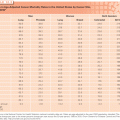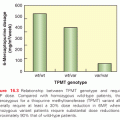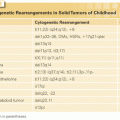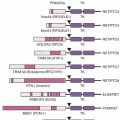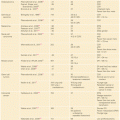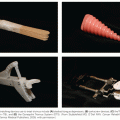Assessment includes a detailed medical history, dietary history, medication review, description of stools, and a physical examination focused on the identification of dehydration abdominal and rectal areas. When appropriate, abdominal radiographs can be ordered to evaluate for abdominal obstruction or fecal impaction. Biochemical parameters should be checked for evidence of dehydration, hypokalemia, or renal impairment. If enteric infections are suspected, stool samples should be sent for fecal leukocytes, C. difficile toxins A and B, and culture for organisms including C. difficile, Salmonella, Escherichia coli, Campylobacter, and infectious colitis.
As described previously, when neutropenic enterocolitis is suspected, computed tomography or ultrasound imaging of the abdomen should be undertaken and additional prognostic information may be obtained by ultrasound evaluation of bowel wall thickness.
General Principles in the Management of Diarrhea
Patients must be rehydrated either orally or when appropriate by parenteral infusion. In cases of large-volume diarrhea, there is the potential for very rapid dehydration with risk of prerenal impairment or even, in extreme cases, shock. Patients may suffer electrolyte imbalance particularly from hypokalemia. In general, milk products should be avoided if an infectious cause is suspected because a transient lactase deficiency sometimes may occur. Special attention should be given to patients who are incontinent of stool due to the risk of pressure ulcer formation. Skin barriers should be used to prevent skin irritation caused by fecal material.
Antidiarrhea Medications
Opioids
Loperamide is generally the opioid of choice because it has local activity in the gut and is absorbed only minimally (this accounts for the lack of systemic effects). It reduces stool weight, frequency of bowel movements, urgency, and fecal incontinence in acute and chronic diarrhea. Loperamide can be started at an initial dose of 4 mg followed by 2 mg every 2 to 4 hours or after every unformed stool.53,54 Other opioids, such as tincture of opium, morphine, or codeine, can be used.
Tincture of opium is a widely used antidiarrheal agent. It is often recommended as an alternative to loperamide. Deodorized tincture of opium contains the equivalent of 10 mg/ml morphine, and the recommended dose is 10 to 15 drops in water every 3 to 4 hours. It is important not to confuse this with paregoric, which is a camphorated (alcohol-based) tincture. The latter is a less-concentrated preparation that contains the equivalent of 0.4 mg/ml morphine. The recommended dose is 1 teaspoon (5 ml) in water every 3 to 4 hours.
Somatostatin Analogues
In cases of severe or persistent diarrhea, the somatostatin analogue octreotide should be considered. Octreotide has multiple antidiarrheal actions including suppression of release of insulin, glucagon, vasoactive intestinal peptide, and gastric acid secretion; reduction in motility and pancreatic exocrine function; and increased absorption of water, electrolytes, and nutrients from the gastrointestinal tract. The usual starting dose for octreotide is 100 to 150 μg subcutaneously/intravenously three times a day.55 As there is a dose response relationship for its antidiarrheal effect, the dose can be titrated up to 500 μg subcutaneously/intravenously three times a day or by continual intravenous infusion 25 to 50 μg/hour.56 A microencapsulated, long-acting formulation of octreotide has been developed for once-monthly intramuscular dosing. This formulation has demonstrated efficacy in resolving severe diarrhea57,58 and preventing further episodes of diarrhea in patients receiving ongoing therapy.57,58
Other Agents
Budesonide is an orally administered, topically active steroid with high activity in inflammatory bowel disease, a 90% first-pass effect in the liver, and therefore low systemic availability. It is commonly used in the management of diarrhea in patients with low- to medium-grade inflammatory bowel disease. A small study demonstrated efficacy of oral budesonide in the management of chemotherapy-induced diarrhea that was refractory to loperamide59; however, studies did not show benefit in prophylactic use to prevent diarrhea induced by irinotecan60 or ipilimumab.61
Specific Management Guidelines
Chemotherapy-Induced Diarrhea
Chemotherapy-induced diarrhea is a major problem in the management of patients with gastrointestinal cancer in which the drugs irinotecan and fluorouracil are commonly used. Diarrhea can be severe and in some cases life-threatening. The most recent American Society for Clinical Oncology guidelines for management of treatment-induced diarrhea were published in 2004.56 Patients are classified as uncomplicated or complicated on the basis of clinical features. and this classification guides treatment approach.
Prevention. Although a randomized trial did not show any advantage of neomycin in the primary prevention of late irinotecan diarrhea,9 there is limited evidence supporting its use as secondary prevention in selected patients.62
“Uncomplicated” Diarrhea. Step 1: Patients with grade 1 or 2 diarrhea with no other complicating signs or symptoms may be classified as “uncomplicated” and managed conservatively with oral hydration and loperamide. Initial management of mild to moderate diarrhea should include dietary modifications (e.g., eliminating all lactose-containing products and high-osmolar dietary supplements), and the patient should be instructed to record the number of stools and report symptoms of life-threatening sequelae (e.g., fever or dizziness on standing). Loperamide should be started at an initial dose of 4 mg followed by 2 mg every 4 hours or after every unformed stool (not to exceed 16 mg/day).
If diarrhea resolves with loperamide, patients should be instructed to continue dietary modifications and to gradually add solid foods to their diet. In the case of chemotherapy-induced diarrhea, patients may discontinue loperamide when they have been diarrhea-free for at least 12 hours.
Step 2: If mild to moderate diarrhea persists for more than 24 hours, the dose of loperamide should be increased to 2 mg every 2 hours, and oral antibiotics may be started as prophylaxis for infection.
Step 3: If mild to moderate chemotherapy-induced diarrhea has not resolved after 24 hours on high-dose loperamide (48 hours total treatment with loperamide), the patient should be seen in the physician’s office or outpatient center for further evaluation, including complete stool and blood workup. Stool workup should include evaluation for pathogens. Fluids and electrolytes should be replaced as needed. Loperamide should be discontinued, and the patient should be started on a second-line antidiarrheal agent such as SC octreotide (100- to 150-μg starting dose, with dose escalation as needed) or other second-line agents (e.g., oral budesonide or tincture of opium).
“Complicated” Chemotherapy-Induced Diarrhea. Patients with mild to moderate diarrhea complicated by moderate to severe cramping, nausea and vomiting, diminished performance status, fever, sepsis, neutropenia, bleeding, or dehydration, and patients with severe diarrhea are classified as “complicated” and should be evaluated further and monitored closely and treated aggressively.
Aggressive management of complicated cases usually necessitates admission and involves intravenous fluids; octreotide at a starting dose of 100 to 150 μg subcutaneously three times a day or intravenously (25 to 50 μg/hour) if the patient is severely dehydrated, with dose escalation up to 500 μg subcutaneously three times a day until diarrhea is controlled, and administration of antibiotics (e.g., fluoroquinolone). These patients should be evaluated with complete blood count, electrolyte profile, and a stool workup evaluating for blood, fecal leukocytes, C. difficile, Salmonella, E. coli, Campylobacter, and infectious colitis.
Radiation Therapy–Induced Diarrhea
The most recent American Society for Clinical Oncology guidelines for management of treatment-induced diarrhea were published in 2004.56 The initial management of uncomplicated radiation-induced diarrhea is the same as for chemotherapy-induced diarrhea: starting with low-dose loperamide and then progressing to high-dose loperamide if diarrhea persists beyond 24 hours.
If diarrhea has not resolved after a further 24 hours on high-dose loperamide, continue loperamide (2 mg every 2 hours). In such cases, the patient should be evaluated; in severe cases, octreotide therapy may be indicated.
Patients with mild to moderate diarrhea complicated by moderate to severe cramping, nausea and vomiting, diminished performance status, fever, sepsis, neutropenia, bleeding, or dehydration, and patients with severe diarrhea are classified as “complicated.” Complicated radiotherapy-induced diarrhea needs intensive monitoring and aggressive management either in hospital or an intensive home care nursing program or an outpatient facility able to provide a high level of care. Patients with severe symptoms or features suggestive of sepsis should undergo complete stool and blood workup and should be treated with octreotide and intravenous antibiotics.
Management of Neutropenic Enterocolitis
Management of neutropenic enterocolitis is challenging and the risk of mortality is high. There are roles for both medical and surgical interventions.
The initial treatment for neutropenic enterocolitis is medical, with the administration of broad-spectrum antibiotics, granulocyte colony-stimulating factors, nasogastric decompression, intravenous fluids, bowel rest, and serial abdominal examinations.16,20,22 In most patients, these measures are sufficient, and symptoms resolve after correction of the neutropenia. The administered antibiotics should have a broad spectrum of activity to cover enteric gram-negative organisms, gram-positive organisms, and anaerobes. Causative microorganisms include Pseudomonas, Staphylococcus aureus, E. coli, and group A Streptococcus.20 Reasonable initial choices include monotherapy with piperacillin-tazobactam or imipenem-cilastatin or duotherapy with cefepime or ceftazidime along with metronidazole.15 In cases that do not respond to antibacterial agents, amphotericin should be considered, because fungemia is common.20 Blood transfusions may be necessary because the diarrhea is often bloody. Anticholinergic, antidiarrheal, and opioid agents should be avoided as they may aggravate ileus.
The indications for and timing of surgical intervention are controversial. The mortality of patients who fail to respond to medical interventions is high, and many patients may not be salvageable. Nonetheless, in selected patients, surgery may be helpful to avoid progressive bowel necrosis, perforation, and to help control sepsis. Commonly cited indications for surgery include (1) persistent gastrointestinal bleeding after correction of thrombocytopenia and coagulopathy, (2) evidence of free intraperitoneal perforation, (3) evidence of abscess formation, (4) clinical deterioration despite aggressive supportive measures, and (5) to rule out other intra-abdominal processes such as bowel obstruction or acute appendicitis examinations.16,20,22,63,64
If exploratory surgery is performed, resection of grossly involved bowel is necessary. All necrotic material must be resected, usually by a right hemicolectomy, ileostomy, and mucous fistula. Failure to remove the necrotic focus in these severely immunocompromised patients is often fatal.64 Primary anastomosis is not generally recommended in such severely immunocompromised patients because of the increased incidence of anastomotic leak.64
Diarrhea Prophylaxis
Prevention of Radiation Diarrhea
Multiple clinical trials have focused on prevention of diarrhea in patients receiving pelvic radiotherapy.65 There is limited data to support the use of probiotic treatment containing Lactobacillus65–67 and/or prophylactic 500 mg sulphasalzaine administered orally twice a day for prevention of radiotherapy-induced diarrhea.65,68,69
Prevention of Chemotherapy Diarrhea
Other than the use of atropine to prevent acute irinotecan diarrhea,70 prophylactic antidiarrheal treatment is not a standard approach for any chemotherapy regimen. Small studies in the prevention of irinotecan-induced diarrhea have suggested the potential utility of oral alkalinization of the intestinal lumen,71 activated charcoal,72 and oral administration of probiotics microorganisms such as Lactobacillus rhamnosus.73
Negative studies have been reported with prophylactic octreotide,74 long-acting octreotide,75 oral racecadotril,76 and oral neomycin.9
Definition
Constipation is the slow movement of feces through the large intestine resulting in infrequent bowel movements and the passage of dry, hard stools. Constipation is a symptom, not a disease. It is usually a temporary condition and is not considered serious.
According to the “Rome 2 Criteria” proposed by a working group of gastroenterologists,77 the clinical definition of chronic constipation is the presence of any two of the following symptoms for at least 12 weeks (not necessarily consecutive) in the previous 12 months:
■ Straining during bowel movements
■ Lumpy or hard stool
■ Sensation of incomplete evacuation
■ Sensation of anorectal blockage or obstruction
■ Manual maneuvers to remove stool
■ Fewer than three bowel movements per week
Prevalence
The prevalence of constipation in patients who have advanced cancer is approximately 40% to 60%78; the greatest prevalence occurs in the opioid-treated population.79–81 Constipation is a major cause of patient distress and is often underappreciated and undertreated.82
Treatment-Related Causes
Medications, in particular opioids, serotonin antagonist antiemetics, and vinca alkaloid chemotherapy agents, are the most common causes of constipation among patients with cancer.
Opioid Analgesics
All opioids cause constipation, and tolerance to this effect is not observed over time. Importantly, the dose response relationship to this effect is very flat and the severity does not appear to be strongly dose-related. There is some data to indicate that the severity is less severe with fentanyl and, possibly, methadone,83,84 and with oxycodone/naloxone combined formulation tablets.85,86 Other medications that are commonly implicated are listed in Table 136.2.
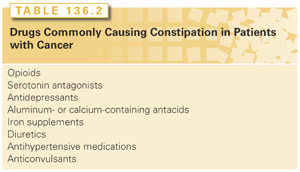
Serotonin 5-Hydroxytryptamine-3 Receptor Antagonists
The 5-hydroxytryptamine-3 receptor antagonist antiemetics slow colonic transit, increase fluid absorption, and increase left colon compliance.87 Overall, these agents are very well tolerated but 2% to 5% of patients report constipation,88 and laxative therapy is often indicated.
Vinca Alkaloids
All the vinca alkaloids have pronounced neuropathic effects and reduce gastrointestinal transit time. Severity appears to be most pronounced with vincristine and vindesine, less so with vinblastine, and least with vinorelbine. Among patients receiving vincristine, it is dose-related and is more common and more severe among patients receiving doses <2 mg total dose.89,90 Severity can range from mild to severe and in one series of 392 patients, 2.8% required hospitalization for adynamic ileus.91 Rarely, life-threatening ileus or megacolon have been reported.92
Thalidomide
Other than sedation, constipation is the most common adverse effect of thalidomide.93
Other Medications
Other constipating drugs commonly used in the care of cancer include those with anticholinergic actions (antispasmodics, antidepressants, phenothiazines, haloperidol, antacids), some anticonvulsants or antihypertensive drugs, iron supplements, and diuretics.94
Differential Diagnosis
Other causes of constipation are also common among patients with advanced cancer. Among other causes that need to be considered are the following:
1. Low-fiber diet: A low-fiber diet or a diet rich in processed and low-fiber foods may exacerbate constipation.95
2. Dehydration: Liquids like water and juice add fluid to the colon and bulk to stools, making bowel movements softer and easier to pass. Liquids that contain caffeine and alcohol have a dehydrating effect.
3. Lack of exercise: Lack of exercise can lead to constipation, although the reason is unclear.95 For example, constipation often occurs after an injury or during an illness that promotes immobility.
4. Colonic pathology: Many patients have coexisting irritable bowel syndrome or diverticular disease. In many instances, constipation may be the first symptom of an impending obstruction due to tumor, adhesions, or a stricture.
5. Neuromuscular disorders: Neurogenic factors may impair normal colonic function including brain tumors, spinal cord compression, or the autonomic failure that is common in patients with far advanced cancer.96 Neural integration of anal sphincter control and rectosigmoid propulsion occurs in the sacral segments of the spinal cord. Damage to sacral segments of the spinal cord or to efferent nerves may lead to severe constipation.97
6. Metabolic disorders: Certain disorders of metabolism commonly seen in patients with cancer can lead to constipation and include the following: hypercalcemia, hyponatremia, hypokalemia, and uremia.94
7. Psychological disorders: Constipation is a common manifestation of depression.98
Diagnosis
Stay updated, free articles. Join our Telegram channel

Full access? Get Clinical Tree


